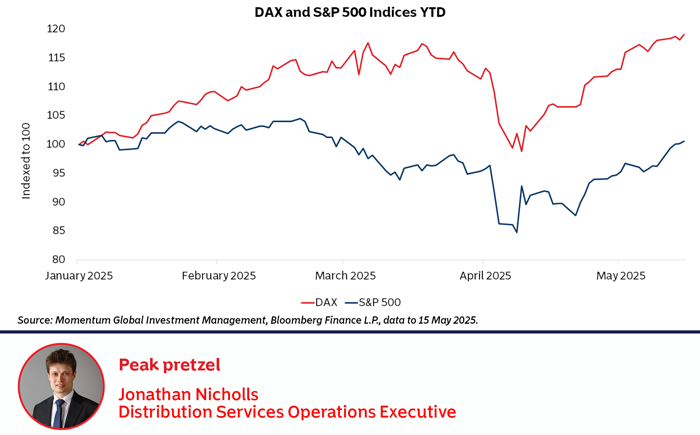
What this chart shows
Salty twists as Germany’s DAX index recovers the collapse from early April and surges into new territory.
On 15 May 2025 the DAX closed at a record high of 23,695.59, representing a 19.0% rise since the beginning of the year, compared to just 0.6% in the S&P 500. Germany has seen a boost from rising defence and infrastructure spending, as the government reorients fiscal priorities in response to geopolitical tensions.
In contrast, while US markets have managed to recoup their post-tariff losses (most major benchmarks share a similar profile in the last couple of months), there remains ongoing pessimism in the US around the impact of the trade war on their domestic economy.
Why this is important
The DAX's ascent amidst global economic uncertainties offers a compelling visual narrative of resilience and progress. Newly appointed chancellor, Friedrich Merz, delivered his first speech on Wednesday 14 May, looking to make Europe’s largest economy a “locomotive of growth” again. Prior to taking office, the new governing coalition had already advanced schemes through parliament to allow increased defence spending by easing strict long-standing debt rules and establishing a large infrastructure fund. Germany starts from a very low military base, since the end of WW2 Germany has (understandably) recoiled from military investments, maintaining only a minimal defence force with no significant land army. The Ukraine war and the US retreat as the "guardian" of Europe has caused a shock reversal of German political thinking. Added to this, much of Germany’s limited military equipment has already been donated to the Ukrainian war effort. Together, these factors point to a multi-year cycle of substantial defence investment, boosting industrial output and supply chains across Europe and perhaps signalling a continued commitment upon which markets can thrive.
Germany has been spearheading a wider European charge, with spending announcements sparking economic optimism across the region. The European Central Bank (ECB) continues to cut interest rates as inflation approaches its 2% target, making the eurozone an attractive proposition.
Allocation within our Momentum GF Global Equity Fund has managed to capture these gains with our German equity exposure outperforming the DAX by approximately 10% year-to-date, highlighting the benefits of diversification and active management.
The week was marked by significant monetary policy actions, with both the Bank of England and the People's Bank of China implementing interest rate cuts to counteract economic pressures from ongoing trade tensions. These measures, alongside renewed US-China trade negotiations, influenced global markets, leading to shifts in investor strategies and market dynamics.

-
The world’s two largest economies agreed to lower tariff duties for 90 days, slashing the US rate on China from 145% to 30%, with Chinese levies on the US dropping from 125% to 10%.
-
Moody’s rating agency cut the US rating to Aa1 from Aaa, saying a ballooning budget deficit showed little sign of narrowing.
-
April inflation slowed to 2.3%, boosting investor confidence. The S&P 500 erased its 2025 losses, led by tech and AI stocks
-
Saudi Arabia, Qatar, and the UAE pledged over $3 trillion in US investments across sectors like AI, defence, and energy, signalling strong international confidence

-
Prime Minister Keir Starmer advanced negotiations on a new EU bilateral relationship, aiming to reduce food trade barriers and integrate emissions trading schemes, while facing domestic political resistance.
-
The UK economy grew by 0.7% in Q1 2025, surpassing forecasts and indicating resilience amid global uncertainties.
-
A proposed mutual recognition of conformity assessment (MRCA) agreement with the EU could increase UK exports by up to 27.9% in sectors like industrial machinery and electronics
-
The Great British Energy Act 2025 was enacted, creating a publicly owned energy firm to accelerate clean energy development and support net-zero commitments.

-
Portugal’s ruling center-right coalition won a snap poll, early results showed. Bucharest’s centrist mayor won Romania’s presidential runoff, defeating a Trump loyalist. Poland’s presidential election will go to a June 1 runoff between a Donald Tusk ally and a nationalist.
-
The European Central Bank may need to cut interest rates to "slightly below" 2% as global trade tensions pose downside risks to inflation and growth, Belgium's central bank governor, Pierre Wunsch, told the Financial Times in an interview published on Saturday.
-
European leaders are to speak to Donald Trump on Monday to help the US president “prepare” for his planned call with Vladimir Putin in attempt to push forward Ukraine peace talks. Russia is preparing a list of conditions for a possible ceasefire and will exchange it with Kyiv privately.

-
Despite a swift tariff rollback agreement with China, the US has yet to provide similar relief to allies like Japan and the EU, who are still negotiating exemptions from recent tariffs.
-
Some Chinese companies from mainland China or Hong Kong are planning IPOs, dual listings, or share placements in Singapore in the next 12 to 18 months as Chinese firms look to expand in Southeast Asia amid global trade tensions.
-
Japan recorded its highest-ever monthly foreign inflows into equities and long-term bonds in April, as global investors sought diversification amidst US tariff shocks.
-
Gold prices, a traditional safe-haven asset, declined as trade tensions eased.
